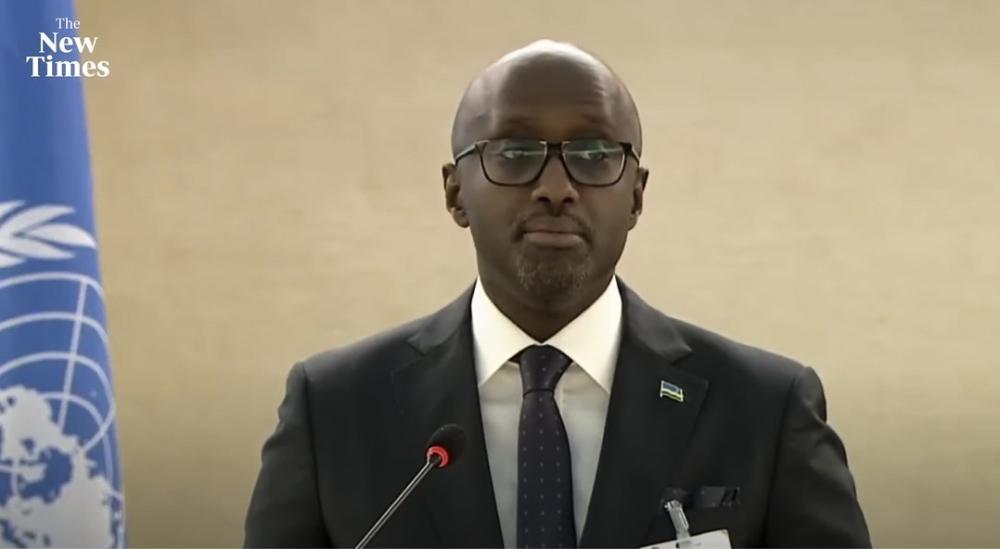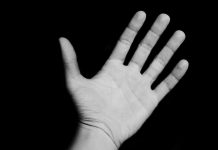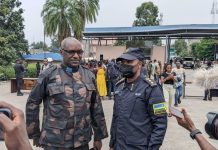Africa-Press – Rwanda. Rwanda’s Minister of Foreign Affairs and International Cooperation Olivier Nduhungirehe on Wednesday, February 26, called on the UN Human Rights Council not to remain silent in the face of hate speech and targeted killings of Tutsi communities in DR Congo, whose government is implicated in the atrocities.
Nduhungirehe, who spoke during the 58th Human Rights Council in Geneva, Switzerland on Tuesday, February 26, said in recent days Congolese government forces carried out attacks on Banyamulenge communities in South Kivu province.
He said hate speech and targeted violence against Congolese Tutsi communities “have become distressingly commonplace.”
The Rwandan minister pointed out that despite remarkable global progress in terms of basic rights over the past three decades, the fundamental right to a dignified life remains unfulfilled in many parts of the world, including the Great Lakes Region where “the cancer of violent ethnic extremism and genocide ideology has once again re-emerged.”
“Communities continue to be targeted for who they are, how they look or even which language they speak – a grim reminder of the horrors witnessed during the 1994 Genocide against the Tutsi in Rwanda.”
In eastern DR Congo, he said “hate speech, persecution, lynching, and even acts of cannibalism against Congolese Tutsi have become distressingly commonplace.”
He pinned the Congolese government on such crimes against humanity, giving examples of South Kivu province, where the Tutsi communities of Banyamulenge are bombed in Minembwe by government forces and are subject to persecutions in different cities like Uvira.
“In Bujumbura, Burundi, they are even rounded up like in the old days and taken to unknown destination. In Kinshasa, Congolese Tutsi and even Swahili speakers are persecuted and lynched in broad daylight, while in Ituri, up north far away from Rwanda’s border, the Hema ethnic group is being slaughtered by the CODECO militia allied to the [Congolese] government and the Islamic ttate-backed ADF, in total impunity,” he said.
Referring to Kinshasa’s ethnic politics as reckless, Nduhungirehe lamented that the government created a fertile ground for systematic human rights abuses committed by armed groups, including the FDLR genocidal militia and the Wazalendo — often bolstered by the complicity of Burundian forces in the country.
“Hate speech is weaponised as a political tool by figures such as Justin Bitakwira, a personal friend to President Tshisekedi and member of parliament from the majority party, who declared that every Tutsi is a ‘natural born criminal,’ wondering if the God that created the Tutsi was the same that created other Congolese,” Nduhungirehe explained.
“This phenomenon is not new; in 1998, former Vice-President and Foreign Minister Abdoulaye Yerodia predicted that the Tutsi will face the same fate as Jews in World War II and dehumanized them, calling them ‘vermin and microbes that must be eradicated methodically,’” he noted.
Nduhungirehe also reflected on the attacks on foreign embassies in Kinshasa on January 28, following the capture of Goma by M23 rebels and the speech made by DR Congo foreign minister Thérèse Wagner where she threatened the UN Security Council that without its intervention, “the streets will take care of it” and “the street does not have order or temperament.”
“Indeed, after [Wagner’s] speech, the streets took care of it. The targeting, the killing and the lynching of Tutsi in eastern DR Congo, as well as in Kinshasa, intensified. Beyond the targeted killings, Banyamulenge villages in Minembwe, South Kivu, are being bombed by attack drones of the Congolese army,” he noted.
He said that such horrors mirrored an incident in the Nturo village in Masisi territory in North Kivu, where 300 homes of Congolese Tutsi were burned down by government-backed militias in October 2023 in broad daylight, while Burundian forces looked on.
“All these horrors are well-documented and form an alarming pattern. In the last trimester of 2024 alone, the United Nations reported that [Congolese] security organs were responsible of more than 30 percent of human rights violations in conflict zones,” he said.
Nduhungirehe contended that under the Universal Declaration of Human Rights, all rights are equal, yet a double standard is evident in the treatment of Tutsi communities in Congo.
“How can this Council remain silent in the face of such injustice?” he posed.
Source: The New Times
For More News And Analysis About Rwanda Follow Africa-Press






